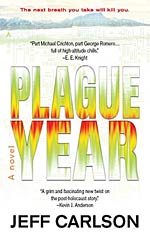
![]() Sable Aradia
Sable Aradia
5/20/2016
![]()
Read for the Apocalypse Now Reading Challenge 2016.
Means of the world's destruction: escaped nanotech virus originally intended to fight cancer that destroys warm-blooded body tissue to replicate itself.
I actually created the Apocalypse Now challenge in order to have an excuse to read this book. I picked it up in the local library because I was intrigued by the cover. Then I read up on it and learned it was shortlisted for the John W. Campbell award but had to decline the nomination because of a rule change. Even more reason to read it!
And then, the scenario: a nanotech virus that destroys warm-blooded body tissue spreads out of control and decimates not only the human population, but all the mammals and most birds as well. The McGuffin: it has a safety valve that shuts it down at 70% air pressure, which generally occurs at approximately 10,000 feet above sea level, give or take a few hundred feet depending on weather conditions. What is left of humanity is surviving on the tops of the world's tallest mountains, slowly starving to death and fighting over limited resources.
I thought: what a great idea! Talk about an original apocalypse! But don't let this book deceive you. It starts off like a piece of high-stakes survivalist apocalyptica, but it's actually an intense military/political thriller with the fate of a much-reduced world at stake.
Nothing wrong with that, in my opinion. Other reviewers have said that they felt that the story shifted to something completely different halfway through, but it was actually only about a third of the way in that it changed into a thriller, and I love a good military/political action-thriller.
However, I can't get really excited about this book because I thought the characters were walking cardboard stereotypes, and for me a novel is about something happening to people I care about. Cutting Carlson some slack, this was his first novel, and he tried. Cam, one protagonist, is a Hispanic ski bum, and Dr. Ruth Goldman, the other protagonist, is a Jewish nanotech scientist - we know she's Jewish because of her name and because she remembered going home for Hanukkah. But...
First of all, Ruth was the perfect stereotype of what the right wing likes to call a "libtard." As a Progressive, she made me embarrassed; constantly bogging down life-or-death scenarios and risking lives because of her conviction in her own righteousness, and coming up with some of the dumbest ways to handle things that I could possibly think of. I could think of about half a dozen less risky plans for stopping the work on the dangerous weaponizing project that the evil governor, who was all that was left of the American government, was hellbent on using against the Chinese and the people who wouldn't do what the surviving HQ of the US, Leadville, wanted, than the one that was chosen; which would not have put them in the position of the incredibly dangerous risky plan to get the vaccine out of Leadville's hands, that might have doomed the whole human race if it had failed; and I have no Ph.D.s. It's clear that Cam, the Everyman Hero, was really the guy that Carlson wanted to write about, and I don't think Carlson liked Dr. Goldman much, he just felt that he needed her to sell the tech and politics aspects of the story.
Second, the governor might as well have been twirling his mustachios, he was so heavy-handedly evil. It was bad. Really bad. Also, as someone else observed, Carlson really wanted us to dislike the character Sawyer. At first I thought that we were just seeing him through the unreliable narrator's eyes of Cam, who has lots of reasons, some logical and some illogical, all human, to hate him; but then Ruth started thinking of him as a "son of a bitch"; and I thought, "Why in the world would Ruth think of Sawyer as a son of a bitch? She doesn't know anything about him!" Yeah, it didn't fly for me either, and that moment took me completely out of the story and I absolutely lost the suspension of disbelief.
Third, the characters were simply not sophisticated enough to deal with the layers of intrigue that Carlson wanted to establish. It came across as improbable because their logic chains in figuring out the layers were so illogical I couldn't swallow it. Once again suspension of disbelief went away. And fourth, which relates to that, was how absolutely terriblethe characters were at gauging the motivations and intentions of the people around them. They were so bad at social gauging that it bordered on autistic, and still, somehow, they were all completely confident in the life-or-death decisions they were making based on their assessment of people's intentions... except that they were always wrong! I would hope I would be better at learning from my mistakes than these two were.
On top of that, the plot quickly became predictable. Expect someone to do the shittiest possible thing to try to screw up an already shitty situation and make it worse; but somehow it's all going to be okay anyway because we know there's two more books in the trilogy.
It wasn't all bad: the action was brilliantly written and the technical aspects were cutting edge and spot-on (I understand that Carlson's dad is a nanotech scientist; can't get closer to it than that without doing it yourself!) But because of the poorly executed character elements and the predictable plotline, I have to give this one a resounding meh.